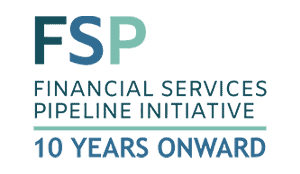2021 Annual Summit Recap
On October 14, 2021, the Financial Services Pipeline (FSP) conducted the 2021 Annual Summit. Hosted by the Federal Reserve Bank of Chicago, the event gathered more than 100 decision makers, thought leaders, and business leaders from approximately 15 Chicago-area financial services firms.
The theme of the conference was “Elevating DEI: INFORMATION – IMPACT – INSPIRATION.” Sessions highlighted pertinent research, tools for uplifting DEI efforts by sharing achievements and making an impact, and how leaders can invest and be held accountable.
Recent research presented by McKinsey partner Tawanda Sibanda analyzed current trends and shifts in financial services, the implications for Black and Latinx talent in the industry, and what FSP firms can do to advance racial equity and DEI efforts collectively and independently.
Next, attendees heard impactful tools from leaders at CIBC, the Illinois State Treasurer, and the Woodstock Institute. Tangible examples and takeaways included: holding leaders accountable for real change, transformation of processes and breaking down barriers, and the role that leaders and firms play in advancing the progression of diverse talent. The FSP Accelerate program, a leadership development program for minority talent created by FSP and Korn Ferry was also showcased
The conference closed out with a keynote address by Stephanie Neely, former Chicago City Treasurer and current executive at J.P. Morgan Asset Management. Neely shared her experiences with diversity, equity and inclusion in her inspiring career along with insights for leaders within the financial services industry.
Event takeaways:
- Building connections to senior leadership – DEI investment starts at the top with buy ins from senior management.
- One of the most effective ways to grow DEI commitment at your organization is through accountability measures such as relating to monetary compensation. An accountability component is necessary for change.
- Participants found that mentorship along with inclusive leadership can be explored as solutions toward bridging the gap.
- There is a need to create opportunities and exposure for marginalized communities.
View the agenda from the conference.
